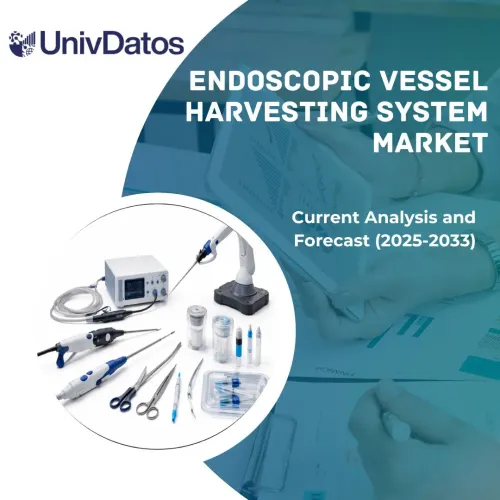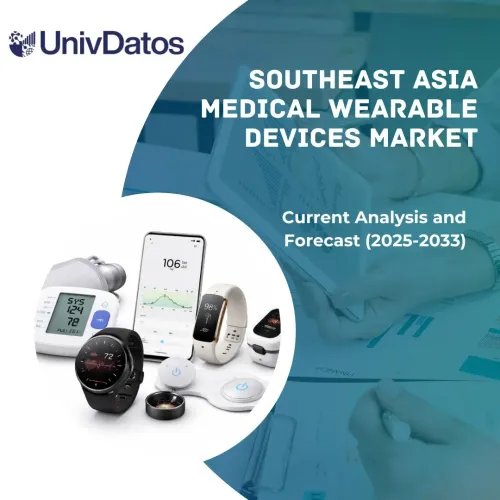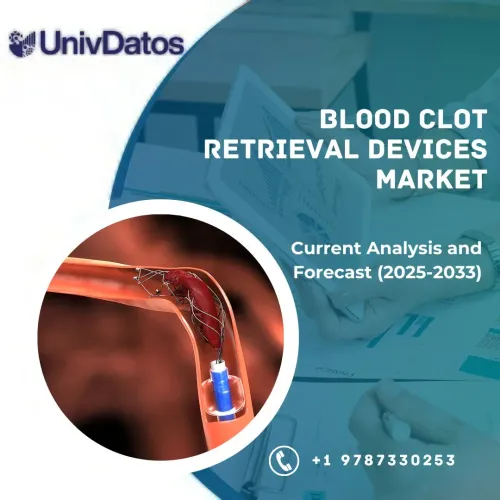- Home
- About Us
- Industry
- Services
- Reading
- Contact Us
HIV Diagnostics Market: Current Analysis and Forecast (2022-2028)
Emphasis on Type (Antibody Tests, Viral Load Tests, CD4 Tests, and Others); End-User (Diagnostic Laboratories, Hospitals, and Others); and Region/Country
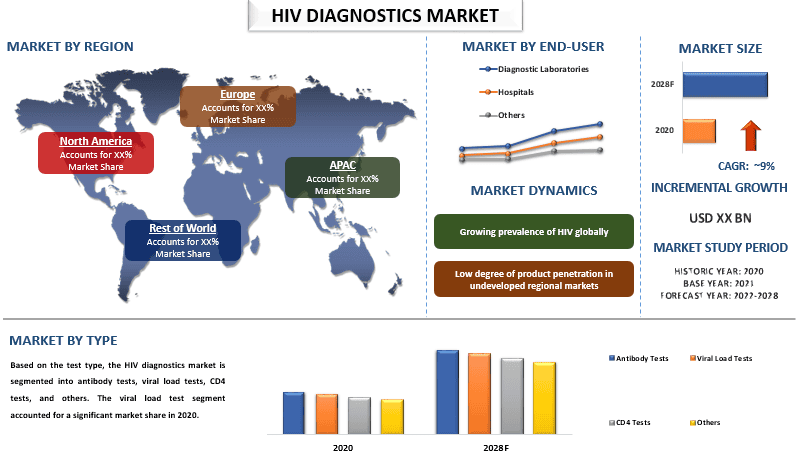
Global HIV Diagnostics Market is expected to grow at a significant rate of around 9% during the forecast period. The global HIV Diagnostics market is anticipated to witness an uptick owing to the growing prevalence of HIV globally, rising number of blood donations, and increasing initiatives by government and regulatory bodies. For instance, the Egyptian government declared in 2020 that all 27 governorates in the nation would have access to free, confidential HIV diagnostic testing. Furthermore, the rapid technological advancement coupled with the growing focus of key industry players to develop and launch novel & advanced diagnostic tests in the market is also driving the HIV diagnostics market across the globe. For example, in 2020, Elecsys HIV Duo immunoassay was introduced in the United States by F. Hoffmann-La Roche AG following approval from the U.S. Food and Drug Administration (U.S. FDA) in April 2020. this is the first 4th generation HIV testing option in the United States that enables distinct detection of HIV p24 antigen and anti-HIV antibodies.
Siemens Healthineers, F. Hoffmann-La Roche Ltd, Abbott Laboratories, Danaher Corporation, Becton, Dickinson & Company, Bio-Rad Laboratories, Thermo-Fisher Scientific Inc., Merck KGaA, Hologic, Inc., OraSure Technologies are some of the key players in the market. Several M&As along with partnerships have been undertaken by these players to facilitate customers with hi-tech and innovative products/technologies.
Insights Presented in the Report
“Amongst test type, viral load test category to witness higher CAGR during the forecast period”
Based on the test type, the HIV diagnostics market is segmented into antibody tests, viral load tests, CD4 tests, and others. The viral load test segment accounted for a significant market share in 2020 and it is estimated that it will grow rapidly during the projected timeframe owing to the increasing frequency of viral load testing in ART-treated HIV patients. Also, these tests improve the efficacy of treatment and produce better results in infected individuals which in turn is also contributing to the increased demand for this test.
“Amongst end-user, the diagnostic laboratories to hold a significant share in the market in 2020”
Based on end-user, the market is fragmented into diagnostic laboratories, hospitals, and others. The diagnostic laboratories segment is expected to grab a considerable market share in 2020 and is expected to grow with a lucrative CAGR during the forecast period owing to the growing awareness of HIV/AIDS among the population globally. Also, rising investments, growing advancement in technology and the presence of advanced diagnostics tools in these laboratories are also some of the factors driving the market of this segment.
“North America to hold a significant share in the market”
For a better understanding of the market adoption of the HIV Diagnostics industry, the market is analyzed based on its worldwide presence in the countries such as North America (U.S., Canada, Rest of North America), Europe (Germany, U.K., France, Spain, Italy, Rest of Europe), Asia-Pacific (China, Japan, India, Rest of Asia-Pacific), Rest of World. North America is anticipated to grow at a substantial CAGR during the forecast period. The major factors such as well-established healthcare infrastructure and the rising incidences of HIV owing to the lack of preventive techniques adopted by people in the region. For instance, In 2019, the estimated number of HIV infections in the U.S. was 34,800 and the rate was 12.6 (per 100,000 people). Furthermore, an increase in government initiatives and an increasing awareness among the population are also driving the market.
Reasons to buy this report:
- The study includes market sizing and forecasting analysis validated by authenticated key industry experts.
- The report presents a quick review of overall industry performance at one glance.
- The report covers an in-depth analysis of prominent industry peers with a primary focus on key business financials, product portfolio, expansion strategies, and recent developments.
- Detailed examination of drivers, restraints, key trends, and opportunities prevailing in the industry.
- The study comprehensively covers the market across different segments.
- Deep dive regional level analysis of the industry.
Customization Options:
The global HIV diagnostics market can further be customized as per the requirement or any other market segment. Besides this, UMI understands that you may have your own business needs, hence feel free to connect with us to get a report that completely suits your requirements.
Table of Content
Research Methodology for the HIV Diagnostics Market Analysis (2022-2028)
Analyzing the historical market, estimating the current market, and forecasting the future market of the global HIV diagnostics market were the three major steps undertaken to create and analyze the adoption of HIV diagnostics in major regions globally. Exhaustive secondary research was conducted to collect the historical market numbers and estimate the current market size. Secondly, to validate these insights, numerous findings and assumptions were taken into consideration. Moreover, exhaustive primary interviews were also conducted, with industry experts across the value chain of the global HIV diagnostics market. Post assumption and validation of market numbers through primary interviews, we employed a top-down/bottom-up approach to forecasting the complete market size. Thereafter, market breakdown and data triangulation methods were adopted to estimate and analyze the market size of segments and sub-segments of the industry pertains to. Detailed methodology is explained below:
Analysis of Historical Market Size
Step 1: In-Depth Study of Secondary Sources:
Detail secondary study was conducted to obtain the historical market size of the HIV diagnostics market through company internal sources such as annual reports & financial statements, performance presentations, press releases, etc., and external sources including journals, news & articles, government publications, competitor publications, sector reports, third-party database, and other credible publications.
Step 2: Market Segmentation:
After obtaining the historical market size of the HIV diagnostics market, we conducted a detailed secondary analysis to gather historical market insights and share for different segments & sub-segments for major regions. Major segments are included in the report as test type and end-user. Further country-level analyses were conducted to evaluate the overall adoption of testing models in that region.
Step 3: Factor Analysis:
After acquiring the historical market size of different segments and sub-segments, we conducted a detailed factor analysis to estimate the current market size of the HIV diagnostics market. Further, we conducted factor analysis using dependent and independent variables such as various test type and end-user of HIV diagnostics. A thorough analysis was conducted for demand and supply-side scenarios considering top partnerships, mergers and acquisitions, business expansion, and product launches in the HIV diagnostics market sector across the globe.
Current Market Size Estimate & Forecast
Current Market Sizing: Based on actionable insights from the above 3 steps, we arrived at the current market size, key players in the global HIV Diagnostics market, and market shares of the segments. All the required percentage shares split, and market breakdowns were determined using the above-mentioned secondary approach and were verified through primary interviews.
Estimation & Forecasting: For market estimation and forecast, weights were assigned to different factors including drivers & trends, restraints, and opportunities available for the stakeholders. After analyzing these factors, relevant forecasting techniques i.e., the top-down/bottom-up approach were applied to arrive at the market forecast for 2028 for different segments and sub-segments across the major markets globally. The research methodology adopted to estimate the market size encompasses:
- The industry’s market size, in terms of revenue (USD) and the adoption rate of the HIV diagnostics market across the major markets domestically
- All percentage shares, splits, and breakdowns of market segments and sub-segments
- Key players in the global HIV diagnostics market in terms of products offered. Also, the growth strategies adopted by these players to compete in the fast-growing market
Market Size and Share Validation
Primary Research: In-depth interviews were conducted with the Key Opinion Leaders (KOLs) including Top Level Executives (CXO/VPs, Sales Head, Marketing Head, Operational Head, Regional Head, Country Head, etc.) across major regions. Primary research findings were then summarized, and statistical analysis was performed to prove the stated hypothesis. Inputs from primary research were consolidated with secondary findings, hence turning information into actionable insights.
Split of Primary Participants in Different Regions
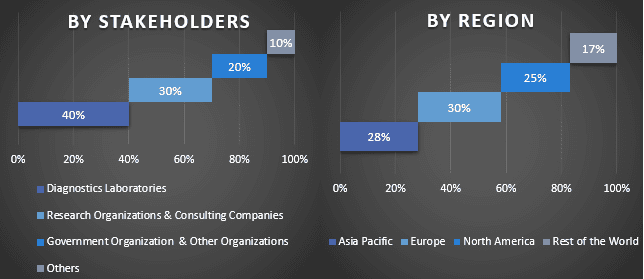
Market Engineering
The data triangulation technique was employed to complete the overall market estimation and to arrive at precise statistical numbers for each segment and sub-segment of the global HIV diagnostics market. Data was split into several segments & sub-segments post studying various parameters and trends in the areas of type, and end-user in the global HIV diagnostics market.
The main objective of the Global HIV Diagnostics Market Study
The current & future market trends of the global HIV diagnostics market were pinpointed in the study. Investors can gain strategic insights to base their discretion for investments on the qualitative and quantitative analysis performed in the study. Current and future market trends determined the overall attractiveness of the market at a regional level, providing a platform for the industrial participant to exploit the untapped market to benefit from a first-mover advantage. Other quantitative goals of the studies include:
- Analyze the current and forecast market size of the HIV diagnostics market in terms of value (USD). Also, analyze the current and forecast market size of different segments and sub-segments
- Segments in the study include areas of test type and end-user.
- Define and analysis of the regulatory framework for the HIV diagnostics
- Analyze the value chain involved with the presence of various intermediaries, along with analyzing customer and competitor behaviors of the industry.
- Analyze the current and forecast market size of the HIV diagnostics market for the major region.
- Major countries of regions studied in the report include Asia Pacific, Europe, North America, and the Rest of the World.
- Company profiles of the HIV diagnostics market and the growth strategies adopted by the market players to sustain in the fast-growing market
- Deep dive regional level analysis of the industry
Related Reports
Customers who bought this item also bought





